
Mary Isobel Catherine Bernadette O'Brien, better known by her stage name Dusty Springfield, was an English singer. With her distinctive mezzo-soprano sound, she was a popular singer of blue-eyed soul, pop and dramatic ballads, with French chanson, country, and jazz in her repertoire. During her 1960s peak, she ranked among the most successful British female performers on both sides of the Atlantic. Her image – marked by a peroxide blonde bouffant/beehive hairstyle, heavy makeup and evening gowns, as well as stylised, gestural performances – made her an icon of the Swinging Sixties.

"I Just Don't Know What to Do with Myself" is a song written by Burt Bacharach and lyricist Hal David.

"Amsterdam" is a song by Jacques Brel. It combines a powerful melancholic crescendo with a rich poetic account of the exploits of sailors on shore leave in Amsterdam. Musically, it takes its base melody line from the melody of the English folk song Greensleeves.

"Heat Wave" is a 1963 song written by the Holland–Dozier–Holland songwriting team. It was first made popular by the Motown vocal group Martha and the Vandellas. Released as a 45 rpm single on July 9, 1963, on the Motown subsidiary Gordy label, it hit number one on the Billboard Hot R&B chart—where it stayed for four weeks—and peaking at number 4 on the Billboard Hot 100.
"I'll Never Stop Loving You" is a popular music song, with music written by Nicholas Brodzsky and lyrics by Sammy Cahn for the 1955 film Love Me or Leave Me. The song was published in 1955.
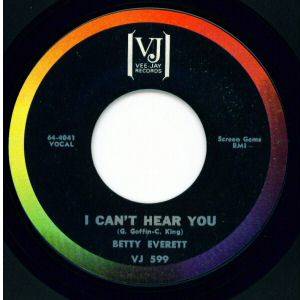
"I Can't Hear You No More" is a composition written by Gerry Goffin and Carole King. It was originally recorded as "I Can't Hear You" in 1964 by Betty Everett. The most successful version was the 1976 top 40 single by Helen Reddy.
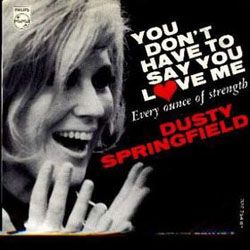
"You Don't Have to Say You Love Me" is a 1966 hit recorded by English singer Dusty Springfield that proved to be her most successful single, reaching number one on the UK Singles Chart and number four on the Billboard Hot 100. It is the cover of a 1965 Italian song by Pino Donaggio and Vito Pallavicini, titled "Io che non vivo (senza te)". Elvis Presley recorded another cover version in 1970 which was a hit in both the US and the UK. Other covers have charted in the UK, Ireland, Italy and Finland.
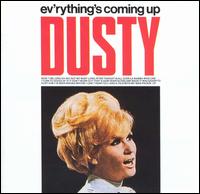
Ev'rything's Coming Up Dusty is the second studio album by singer Dusty Springfield, released on Philips Records in the UK in 1965. Springfield's 1964 debut album, A Girl Called Dusty, sold well enough to make her Philips Records' top-selling female artist. For this, her second album, Philips presented it in a gatefold sleeve and included extensive liner notes. While including a number of fairly standard "pop" songs, Ev'rything's Coming Up Dusty also saw Springfield venturing more into show tunes like "Who Can I Turn To ?" as well as the soul music for which Springfield became so well known for singing. "Doodlin'" and "That's How Heartaches Are Made" were minor hits for Baby Washington, one of Springfield's personal favourite singers. Springfield also included the song "La Bamba", which was a popular concert number for her, though not in step with the general style of the album. The album gave Dusty another chart success peaking at No.6 on the UK Charts and No.4 on the NME charts that following month.

Dusty is the second album of singer Dusty Springfield to be released in the USA. It was issued on the Philips Records label in 1964 and includes Springfield's hit singles "All Cried Out", "I Just Don't Know What To Do With Myself" and the double A-side "Guess Who?"/"Live It Up".
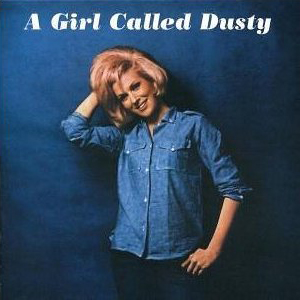
A Girl Called Dusty is the debut studio album by English singer Dusty Springfield. It was released on 17 April 1964 in the United Kingdom by Philips Records. The album peaked at No. 6 on the UK Album Charts and No.5 on NME charts in May 1964.
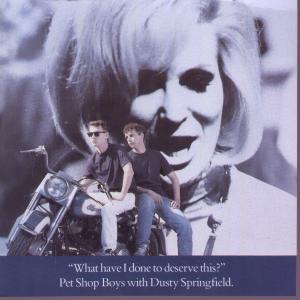
"What Have I Done to Deserve This?" is a song by English synth-pop duo Pet Shop Boys and soul singer Dusty Springfield, taken from the duo's second studio album, Actually (1987). The song was released as the second single from the album on 10 August 1987.

"I Only Want to Be with You" is a song written by Mike Hawker and Ivor Raymonde. The debut solo single released by British singer Dusty Springfield under her long-time producer Johnny Franz, "I Only Want to Be with You" peaked at number 4 on the UK Singles chart in January 1964.

"The Windmills of Your Mind" is a song with music by French composer Michel Legrand and English lyrics written by American lyricists Alan and Marilyn Bergman. French lyrics, under the title "Les Moulins de mon cœur", were written by Eddy Marnay.

"This Guy's in Love with You" is a hit song written by Burt Bacharach and Hal David and released by Herb Alpert in May, 1968. Although known primarily for his trumpet playing as the leader of the Tijuana Brass, Alpert sang lead vocals on this solo recording, which was arranged by Bacharach. An earlier recording of the song by British singer Danny Williams with different lyrics, titled "That Guy's in Love", appeared on Williams' 1968 self-titled album.
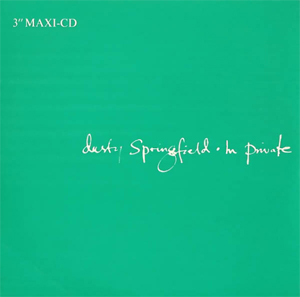
"In Private" is a song by British singer Dusty Springfield, released as a single on 20 November 1989. It was Springfield's third single in a row to be a chart success, after an absence of nearly two decades from the charts. Both "In Private" and Springfield's previous single, "Nothing Has Been Proved" were produced by Pet Shop Boys, who helped return Springfield to prominence with their 1987 hit collaboration "What Have I Done to Deserve This?". Both Springfield singles were included on her 1990 British album Reputation. "In Private" peaked at number 14 in the British charts and was a top ten hit in West Germany, the Netherlands, Belgium (Flanders) and Sweden.
"Wishin' and Hopin'" is a song, written by Hal David and Burt Bacharach, which was a US Top 10 hit for Dusty Springfield in 1964.
"Mockingbird" is a 1963 song written and recorded by Inez and Charlie Foxx, based on the lullaby "Hush, Little Baby".

Norma Cecilia Tanega was an American folk and pop singer-songwriter, painter, and experimental musician. In the 1960s, she had a hit with the single "Walkin' My Cat Named Dog" and wrote songs for Dusty Springfield and other prominent musicians. In later decades, Tanega worked mostly as a percussionist, playing various styles of music in the bands Baboonz, hybridVigor, and Ceramic Ensemble. She also wrote "You're Dead", which was used as the theme song of the film What We Do in the Shadows and the TV series of the same name.

Just a Little Lovin' is the tenth studio album by Shelby Lynne, released in the United States and Canada on January 29, 2008. The album is a tribute to British singer Dusty Springfield, and features covers of nine songs popularized by her, in addition to "Pretend", an original song written by Lynne. In contrast to the more fully instrumented original versions Dusty Springfield recorded, Lynne's remakes featured sparse arrangements, favoring acoustic guitars and pianos rather than a string or horn section.

"Wherever Would I Be" is a song by American rock band Cheap Trick, released in 1990 as the second single from their eleventh studio album, Busted (1990). It was written by American songwriter Diane Warren and produced by Richie Zito. "Wherever Would I Be" peaked at number 50 on the US Billboard Hot 100.

















